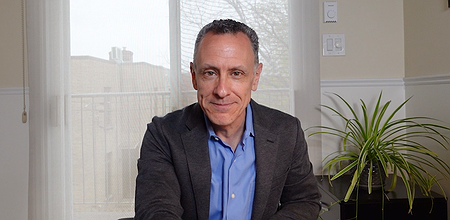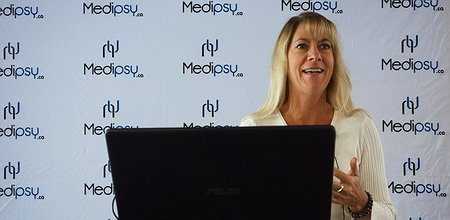- Understand primary, secondary, and instrumental emotions
- Explore the development of emotional vulnerability
- Apply strategies to transform emotional vulnerability through adaptive emotional processes
Creating Emotional change with Emotion-Focused Therapy
Dr. Ladislav Timulak, Psychologist
Help your clients go from psychological distress to adaptive feelings
Excerpt: emotion focused therapy
- 3h30 of continuing education
- 22 lessons that last from 5 to 15 minutes each
- 1 certificate of achievement
- 1 power-point
- 1 bibliography
- 1 course evaluation
- 7-day money back guarantee
- Unlimited access
- 89% of participants who completed the satisfaction survey declare they would recommend this course to a colleague
Overview
Emotions are a powerful instrument in psychotherapy, signaling whether our needs are being met within an environment. They can manifest as either painful or adaptive experiences, each carrying significant meaning. During sessions, painful emotions can be brought into awareness, activated, tolerated, and ultimately transformed into adaptive feelings.
Emotionally Focused Therapy (EFT) offers a robust framework for engaging with clients' emotions during sessions and aiding them in making sense of their emotional pain. To facilitate the integration of EFT's key concepts into your practice, Dr. Timulak has developed this hands-on course, which covers:
- differentiating between primary, secondary and instrumental emotion;
- assessing client emotion processing styles;
- maladaptive emotional processes;
- case conceptualisation;
- the role of the therapeutic relationship in EFT;
- working with emotional avoidance and emotional dysregulation;
- key EFT tasks and interventions (such as Two Chair Dialogue for working with self-criticism);
- transforming core emotional pain in therapy through the activation of adaptive emotional processes.
This course is designed to equip you with all the necessary tools to help your clients master their relationship with their emotions.
Accreditation
Collège des médecins du Québec
For physicians who practice psychotherapy, training recognized by the Ordre des psychologues du Québec is automatically considered as activities adopted by the Collège des médecins, in accordance with Article 3 of the Regulation.
For physicians who do not practice psychotherapy, the College evaluates each recognition request based on the following criteria:
- the relevance of the activity to the practice of the profession
- the skills and experience of the trainer
- the quality of the content and its adequacy with the physician's practice
- the pedagogical framework of the activity
- the quality of the documentation provided
- compliance with the training objectives set out in the regulation
- the presence of a certificate of participation or an evaluation
About the expert

Ladislav Timulak, psychologist, is Professor in Counselling Psychology at Trinity College Dublin, Ireland. He is Course Director of the Doctorate in Counselling Psychology.
Ladislav (“Laco”—read “Latso”) is involved in various psychotherapy trainings in Ireland and internationally. His main research interest is psychotherapy research, particularly the development of emotion-focused therapy (EFT). He currently is adapting this form of therapy as a transdiagnostic treatment for depression, anxiety, and related disorders.
He is also researching the use of mental health interventions delivered online.
He has written or co-written ten books, more than 100 peer reviewed papers and chapters in both his native language, Slovak, and in English. His most recent books include
- Transforming Emotional Pain in Psychotherapy: An Emotion-Focused Approach (2015),
- Transforming Generalized Anxiety: An Emotion-Focused Approach (with James McElvaney; 2018);
- Essentials of Descriptive-Interpretive Qualitative Research: A Generic Approach (with co-author Robert Elliott);
- Transdiagnostic Emotion-Focused Therapy (with co-author Daragh Keogh);
- Essentials of Qualitative Meta-Analysis (with Mary Creaner)
- Transforming Emotional Pain: An Emotion-Focused Workbook . with several co-authors.
He maintains a part-time private practice.
Learning objectives
Learning material
This workshop includes theory as well as clinical examples. It includes videos of 5 to 15 minutes each. The power-point of the workshop can be downloaded.
Syllabus
- Powerpoint
-
What is Emotion-Focused Therapy?
- 1. Presentation
- 2. Main Trials
-
Understanding and Transforming Emotional Pain
- 3. Understanding of Psychological Distress
- 4. Emotional Pain
- 5. Loneliness, Shame and Fear
- 6. Responding to Emotional Pain
- 7. Clinical Vignette
-
Working with Emotional-Focused Therapy
- 8. Emotion Focused Therapy
- 9. EFT Therapist
- 10. Differentiation of Emotions
- 11. Therapist's Style
- 12. Clinical Vignette
- 13. Experiential Tasks
- 14. Transformatory Tasks
- 15. Clinical Vignette
- 16. Corrective Relational Experiences
- 17. Examples of Tasks
- 18. Compassionate and Validating Relationship
- 19. Use of Case Conceptualization
- 20. Modulating Dysregulation
- 21. Symptoms and Core Pain
- 22. Summarize
- Bibliography
CE Credits
Download a certificate of successful completion.
Audience
This training is intended for mental health professionals.
Your comments
"All good."
A psychotherapist (Ireland)
Registration
Ask a question
Do you have a question? Then email us at contact@asadis.net
Frequently asked questions
-
Is there an evaluation at the end of the course?
To validate the achievement of the learning objectives, a final evaluation in the form of true/false questions is required. It must be completed in order to obtain the certificate of completion.
In addition, an optional self-assessment is offered at the beginning and end of the course, allowing you to measure your progress on the targeted skills.
These evaluations are not graded and are intended primarily to support your professional reflection.
-
I have a disability. Can I receive specific support?
Yes! This training is offered as a pre-recorded video format, without subtitles. If you have a disability, we can provide an adapted alternative (technical assistance for viewing or individual supervision). For any request, please contact our disability coordinator at the following address: contact@asadis.net
-
How long do I have access to the course?
After your registration, the course is accessible anytime and from anywhere with unlimited access.
-
When does the course start?
That is entirely up to you! When you buy a course, you'll receive an access link that you can activate when you want.
-
Is there a student rate?
Yes there is! To learn more, email us at contact@asadis.net.
You may also be interested in:
Legal notice
The courses offered by ASADIS are accredited by different professional organisations. In addition, ASADIS is approved by the Canadian Psychological Association to offer continuing education for psychologists. ASADIS maintains responsibility for the program.
The CPA’s approval of an individual, group, or organization as a CE Sponsor or Provider is restricted to the activities described in the approved application or annual report form. The CPA’s approval does not extend to any other CE activity the Sponsor or Provider might offer. In granting its approval, the CPA assumes no legal or financial obligations to Sponsors, Providers, or to those individuals who might participate in a Sponsor or Provider’s CE activities or programs. Further, responsibility for the content, provision, and delivery of any CE activity approved by the CPA remains that of the CE Sponsor or Provider. The CPA disclaims all legal liability associated with the content, provision, and delivery of the approved CE activity.






